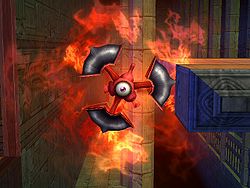Glire
| Glire | |
|---|---|
 A Glire. | |
| Universe | Super Smash Bros. |
| Level(s) appears in | The Path to the Ruins The Cave The Ruins The Canyon Battleship Halberd Interior Subspace II The Great Maze |
| Point worth | 400 |
A Glire (ガルファイア Garufaia, Galfire) is an enemy in Super Smash Bros. Brawl's Subspace Emissary mode. It appears as a round machine (wheel, according to the trophy) with a central eye. Glires move around by rolling on floors, walls, and ceilings, although they will fall down if they flinch. When a player approaches it, a Glire will pause, open up, and spew fire out of its body. This attack only hits once, so shielding it allows a large lag time in which to attack. Like flame Jyks, Glires appear in caverns and ruins.
Glires reappear in Smash Run in Super Smash Bros. for Nintendo 3DS, with similar function.
Name origin
Glire's name is a combination of the words glare, referring to its eyes on either side of its body that are wide open, and fire, referring to its flame attack.
Damage taken
| Damage taken | ×1.0 | ×1.0 | ×1.0 | ×2.0 | ×0.2 | ×1.0 | ×2.3 | ×1.0 | ×1.0 | ×1.0 | ×0.75 |
Trophy description
An enemy shaped like a tire. It's protected by three black shells, but they're not so hard as to be impenetrable. The outermost shell is covered in mucus that lets it stick to surfaces as it rolls along walls and ceilings. The eye in its center is creepy. When it spots the player, it stops, sheds its outer layers, and spouts fire from its inner recesses.
Gallery
- Glire Smash Run.png
A Glire (top right) in Smash Run.
Trivia
- As a trophy, the Glire is the only one of its family that doesn't separate into the stretched form, which shows its element.
See also
| Smash Run | |
|---|---|
| Enemies | Bacura · Banzai Bill · Bill Blaster · Bonkers · Boom Stomper · Bronto Burt · Bubble · Bulborb · Bullet Bill · Bumpety Bomb · Chain Chomp · Chandelure · Clubberskull · Cryogonal · Cucco · Daphne · Darknut · Devil Car · Eggrobo · Flage · Flame Chomp · Fly Guy · Gastly · Geemer · Generator · Ghost · Giant Goomba · Glice · Glire · Glunder · Goomba · Gordo · Hammer Bro · Iridescent Glint Beetle · Kihunter · Koffing · Koopa Paratroopa · Koopa Troopa · Kritter · Lakitu and Spinies · Lethinium · Lurchthorn · Magikoopa · Mahva · Megonta · Metroid · Mettaur · Mimicutie · Mite · Monoeye · Nutski · Octorok · Orne · Parasol Waddle Dee · Peahat · Petilil · Plasma Wisp · Polar Bear · Pooka · Poppant · Reaper & Reapette · ReDead · Reo · Roturret · Shotzo · Shy Guy · Skuttler · Sneaky Spirit · Souflee · Spike Top · Starman · Stalfos · Tac · Tiki Buzz · Waddle Dee · Waddle Doo · Zuree |

